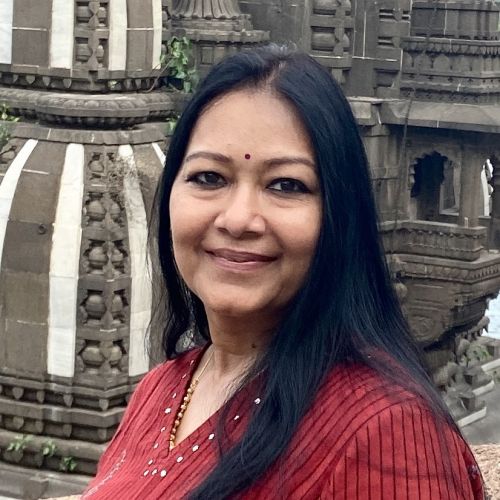
- Country: India
- Poems: 'The Central Asian Flyway & the Apricot Farmer of Ladakh', 'The Silent Fair', ‘Oil Spill’
Vinita Agrawal
Bio
Vinita Agrawal’s latest collection of poems Twilight Language was the winner of the Proverse prize Hongkong 2021. The other four books of poetry she has authored are - Words Not Spoken, The Longest Pleasure, The Silk of Hunger and Two Full Moons. She is based in Indore, India. She was awarded the Rabindranath Tagore Literary Prize 2018 and the Gayatri GaMarsh Memorial Award for Literary Excellence, USA, 2015 and a special mention in the Hawkers Prize 2019. Her work was shortlisted for the inaugural Dipankar Khiwani Memorial prize 2021. Her work has been published in ‘Indian Quarterly’, ‘The Bombay Literary Magazine’, ‘Pratik’, ‘Mascara Literary Review’, ‘AsianCha’, Wildword, ‘Human Obscura’, ‘Amphibian’ among others. Her poem ‘Home’ was carried in the Knopf Newsletter during the national poetry month in April 2022. Her poems have been widely anthologised and appear in anthologies such as The Tiferet book of Spiritual Poetry Offerings, the Chicago Anthology of Moon Poems, Women’s Poetry India and South Africa Mingled Voices Vol.7 (Proverse) etc. She is Poetry Editor with ‘Usawa Literary Review’. She has edited two anthologies on climate change Open Your Eyes in (2020) and Count Every Breath (2023) both published by Hawakal. She was one of the twenty poets to be featured in a documentary on Asian poets titled Deepest Uprising made in Taiwan. She is on the Advisory Board of the Tagore Literary Prize. She is Co chair for CoE - a Global Council for Excellence for Environment and Sustainability. She is on the Advisory Board G100 World Peace and a Council Member of WICCI. She is an amateur birder and photographer.
What are the ecological / social crises within your region / country?
Shortage of clean drinking water is a worrying crisis in India. Although there are great rivers like the Ganga and the Yamuna in my country, however the increase in population has made huge demands on existing water resources. Besides, the rivers are heavily polluted. They are not safe for drinking especially in urban areas. Monsoons are another source of water supply in India but over 90% of rain water drains off into the sea (rendering it undrinkable) in the absence of proper rain harvesting techniques. We need to clean up our rivers on a war footing. We also need to make sure that rain water does not get wasted. The water crisis has led to peculiar social customs in some states of India. In the state of Maharashtra, men marry thrice, just for water, each bride a water bride. The women have to fetch water from a great distance and find it impossible to cope with the demands of their families. Hence they actually welcome the second/third wives of their husbands because it means less burden on them physically. Now three women can share the labour of the task earlier performed singly by the first wife.